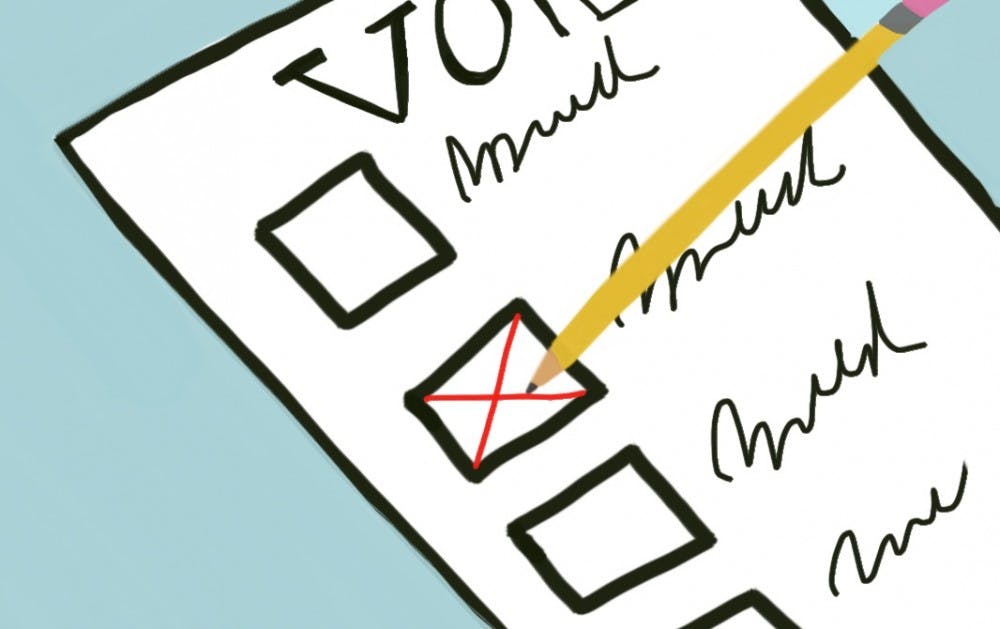ASU student government has continued to suffer from low voter turnout across all campuses, an issue that has persisted in this year's elections and left a number of lingering senate vacancies.
With a total of just 5,360 votes across all campuses, according to the Associated Students of ASU, voters represented only 7% of the entire on-campus student body.
ASU has about 73,000 on-campus students across all campuses, according to an article in ASU Now.
While the number of votes is close to that of previous years, members of Undergraduate Student Government have attributed the generally low turnout to a lack of student engagement and interest.
Undergraduate Student Government Downtown senate president Yasmin Alvarado said that the low turnout reflects the student body's unfamiliarity with USG and its responsibilities.
“Students don’t know us," Alvarado said. "Low voter turnout could also be due to lack of competition ... I feel that students do not want to vote because the results are already known, so they're probably thinking 'What difference does it make?'"
Because not a lot of people run for office, students may view some of the races as foregone conclusions, leading them to not vote, she said.
The lack of people running for office also leads to vacancies, which Alvarado said prevents student government branches from planning more events and reduces their activity on campus.
“With less staff members, we have less people to help plan events and we can't be as active as we want to be,” she said.
Anna Vuong, a senior studying computer science, said the only time she had heard of USG was because her friend ran for senator.
“I’m just curious about what they even manage," Vuong said. "They should market more on how they can be a voice for the students."
Ryan Magel, a Undergraduate Student Government Tempe senator for The College of Liberal Arts and Sciences, agreed with Vuong and said that the organization needs to improve on connecting to the students they represent.
"We’re supposed to be the voice that advocates for the student body," Magel said. "If we’re not doing enough outreach, if we’re not making sure we’re connecting with students and figuring out exactly what they want to happen in the University, then we’re not going to have the respect that we should have."
He also said that issues in making meetings more accessible for students is another factor that hinders engagement with the student body. He cited a recent amendment to a bylaw that requires all meetings to be streamed online, a rule that has been violated for the past three weeks.
"The senate president and senate clerk have not been doing it, so we're trying our best to make it more accessible," Magel said. "But in the end, if we don't follow our own rules, then we're not going to be able to make that happen."
Some of USG's senate vacancies are also a result of resignations. The Downtown Phoenix campus currently has five senate vacancies across a range of schools, including the College of Integrative Sciences and Arts and the Edson College of Nursing and Health Innovation.
Joshua Blinkoff, USG Tempe senate president, said that students who join student government have other commitments that force them to resign from their positions.
"We have very highly motivated, very involved students who join student government," Blinkoff said. "So often times, their involvement in school and clubs and political organizations or political internships outside USG take a ton of time and sometimes that causes people to prioritize and resign."
Others said they believe that the reason senators leave their positions is because of the more institutionalized issue of being underpaid for long hours of work.
Elyse Kats, a senior majoring in sustainability and a previous USG Tempe senator in 2017, said that the workload required for USG can turn away students.
"Being a senator is hard," Kats said. "The meetings are long and boring at night, and you're underpaid, especially as a committee chair."
"If meetings were more streamlined and pay was better, people would stay," she said. "And I quit because I knew these issues wouldn't be fixed under who was elected as senate president when I ran."
Magel agreed that the USG members are expected to act both as student senators and to fulfill a job.
"The thing about USG is that we have to strike this nice balance between being a department, a leadership opportunity and a job," he said.
Reach the reporter at wmelhem@asu.edu or follow @wissmel on Twitter.
Like The State Press on Facebook and follow @statepress on Twitter.




